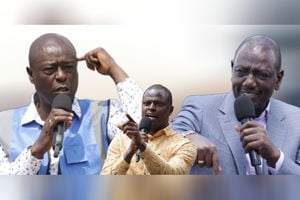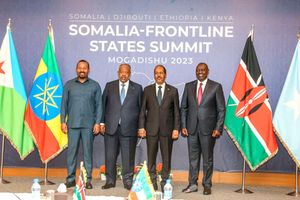Tanzanian President Julius Nyerere casts his ballot to vote for his successor, on October 27, 1985, in Dar es Salam, Tanzania, during presidential elections.
2024 is a make-or-break year for democracy worldwide. More than two billion people across 50 countries are slated to hold presidential or parliamentary elections this year, the biggest election year ever in history.
In Africa, 19 countries are expected to hold presidential or general elections. But democracy in Africa is on a rough patch. In recent years, the failure of elected leaders to deliver services and meet the popular aspirations of voters for stability and development has fueled dissatisfaction with the way democracy works.
A combination of unsustainable debts, high inflation, growing poverty, rising cost of living and mass youth unemployment in Africa have eroded public confidence in democratic governance, undermined dominant parties and increased the attraction of military coups and interventions. Will elections in 2024 lead to a democratic momentum or retreat?
Democracy is meeting its waterloo in declining economies. Africa holds elections in 2024 against the backdrop of declining economies.
According to the UN World Economic Situation and Prospects 2024 report, the continent’s economic growth is projected to remain weak, increasing from an average of 3.3 per cent in 2023 to 3.5 per cent in 2024.
Africa’s economic woes are complicated by debt sustainability, food insecurity, energy crisis and high inflation, which increase the cost of living and stoke popular protests.
In Southern Africa, South Africa and Botswana will hold elections. In South Africa, a combination of multiple corruption scandals, lengthy power cuts, a declining economy and high cost of living have eaten into the popularity of the ruling African National Congress (ANC).
According to opinion polls, for the first time since the fall of apartheid in 1994 the party risks losing its parliamentary majority, which could drop below 50 per cent of the national vote in the 2024 general election.
The populist party, Economic Freedom Fighters, led by former ANC youth leader Julius Malema is rising. Currently, pundits are focusing on the prospects of a coalition government. But the spectre of stability in Africa’s second largest economy looms larger.
Even as the main competition comes from white-led centrist Democratic Alliance, the largest opposition party, the nationalist coalition in South Africa is disintegrating fast. Former President Jacob Zuma is said to be decamping from the ANC and launching a new political party.
The ANC might enter a slide into instability as it tries to push to replace Cyril Ramaphosa as its leader if the party performs poorly.
Botswana is set to host general elections in October, predicted to be the most competitive in the nation’s history. President Mokgweetsi Masisi, who has had running tensions with the country’s 4th and former President Ian Khama, will be running for re-election as the standard-bearer for the ruling Botswana Democratic Party (BDP). Mozambique also holds presidential and legislative elections on October 9.
In West Africa, Senegal and Ghana will hold elections. Here, the incumbents have respected the term limit and are stepping down. In ular opposition leader Ousmane Sonko to compete in the presidential race on February 25 has triggered violent protests. Prime Minister Amadou Ba is the favourite to take over from President Macky Sall, but this is unlikely to foster cohesion in Senegal.
Moreover, Guinea-Bissau is expected to hold presidential elections in December. But the former Portuguese colony faces a turbulent electoral environment in 2024. Here, in December 2023, President Úmaro Sissoco Embaló dismissed Parliament for the second time, alleging coup attempts. This has contributed to paralysis in the government.
Several of the Sahelian countries that faced a series of coups in recent years are scheduled to host elections this year. In Guinea, where a military junta led by Colonel Mamady Doumbouya seized power from Guinea’s first democratically elected president, Alpha Condé, in September 2021, Presidential and Legislative are expected in December 2024. Guinea might transition back to a democratic path.
Chad will also host presidential and legislative elections in October–November. General Mahamat Déby is expected to retain power. Déby took control of the Chadian government in an April 2021 military coup following the death of his father, President Idriss Déby, who had himself seized power in a coup 30 years earlier. In September 2023, the military juntas in Mali and Burkina Faso postponed Presidential elections scheduled for February 4 and July, respectively.
In the turbulent Horn and Great Lakes Region, Rwanda, Somaliland and South Sudan will hold elections in 2024. In Rwanda, Paul Kagame is expected to be re-elected for a fourth term on July 15, having led the country since 2000 and secured nearly 99 per cent of the vote in the 2017 elections.
South Sudan’s President Salva Kiir announced that the country will hold presidential and legislative elections in December 2024, the first ever since independence in 2011. Kiir will be a candidate, raising the stakes for the stability of the elections in a country that has been in a civil war since 2013.
The self-declared state of Somaliland is set to hold its long-delayed presidential election on November 13. President Muse Bihi Abdi will be running for a second 5-year term. But Somalia’s breakaway north is in the eye of the storm of the growing instability in the Horn of Africa.
An seaport agreement with Ethiopia has fueled tensions across the Horn. In October last year, Prime Minister Abiy Ahmed called for a seaport for landlocked country, prompting fears of renewed tensions with neighbouring Eritrea.
Somaliland’s agreement with Ethiopia in the new year has driven a wedge between Ethiopia and Somalia. Elections alone will not secure democracy. Africa needs stability to underpin peaceful development and prosperity.
- Professor Peter Kagwanja former Government Adviser (2007-2013) and currently Chief Executive at the Africa Institute (API). He is the co-author of Kenya's Uncertain Democracy: The Electoral Crisis of 2008 (London: Taylor & Francis, 2013, 224pp.)







